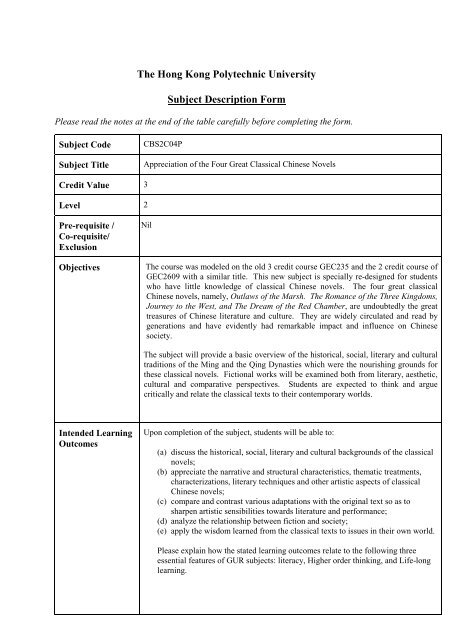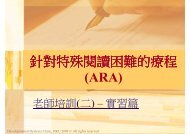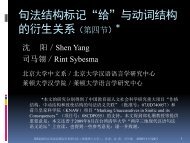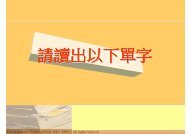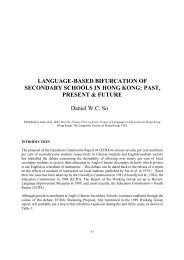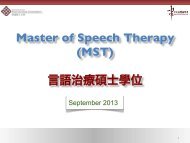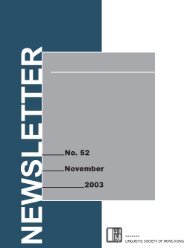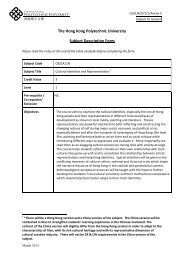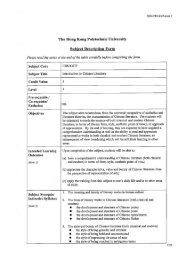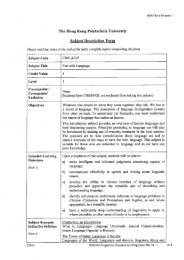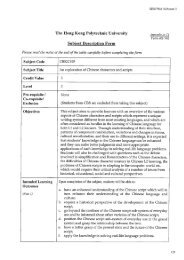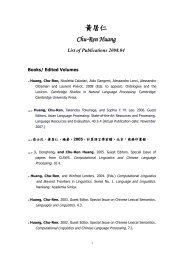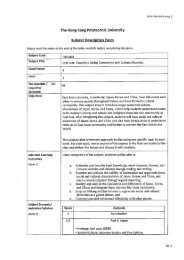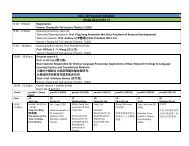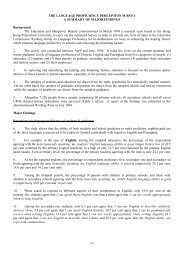C5. DEFINITIVE COURSE DOCUMENT AND COURSE FILE
C5. DEFINITIVE COURSE DOCUMENT AND COURSE FILE
C5. DEFINITIVE COURSE DOCUMENT AND COURSE FILE
You also want an ePaper? Increase the reach of your titles
YUMPU automatically turns print PDFs into web optimized ePapers that Google loves.
The Hong Kong Polytechnic University<br />
Subject Description Form<br />
Please read the notes at the end of the table carefully before completing the form.<br />
Subject Code<br />
Subject Title<br />
CBS2C04P<br />
Appreciation of the Four Great Classical Chinese Novels<br />
Credit Value 3<br />
Level 2<br />
Pre-requisite /<br />
Co-requisite/<br />
Exclusion<br />
Objectives<br />
Nil<br />
The course was modeled on the old 3 credit course GEC235 and the 2 credit course of<br />
GEC2609 with a similar title. This new subject is specially re-designed for students<br />
who have little knowledge of classical Chinese novels. The four great classical<br />
Chinese novels, namely, Outlaws of the Marsh. The Romance of the Three Kingdoms,<br />
Journey to the West, and The Dream of the Red Chamber, are undoubtedly the great<br />
treasures of Chinese literature and culture. They are widely circulated and read by<br />
generations and have evidently had remarkable impact and influence on Chinese<br />
society.<br />
The subject will provide a basic overview of the historical, social, literary and cultural<br />
traditions of the Ming and the Qing Dynasties which were the nourishing grounds for<br />
these classical novels. Fictional works will be examined both from literary, aesthetic,<br />
cultural and comparative perspectives. Students are expected to think and argue<br />
critically and relate the classical texts to their contemporary worlds.<br />
Intended Learning<br />
Outcomes<br />
Upon completion of the subject, students will be able to:<br />
(a) discuss the historical, social, literary and cultural backgrounds of the classical<br />
novels;<br />
(b) appreciate the narrative and structural characteristics, thematic treatments,<br />
characterizations, literary techniques and other artistic aspects of classical<br />
Chinese novels;<br />
(c) compare and contrast various adaptations with the original text so as to<br />
sharpen artistic sensibilities towards literature and performance;<br />
(d) analyze the relationship between fiction and society;<br />
(e) apply the wisdom learned from the classical texts to issues in their own world.<br />
Please explain how the stated learning outcomes relate to the following three<br />
essential features of GUR subjects: literacy, Higher order thinking, and Life-long<br />
learning.
Literacy<br />
The course is by nature reading and writing intensive. The subject requires students<br />
to read the original texts of the four great novels and other scholarly articles on the<br />
four novels.<br />
Higher-order thinking<br />
Students are expected to analyse/ debate on the themes and moral judgments expressed<br />
by the authors as well as the aesthetic and cultural value of the great works.<br />
Life-long learning<br />
Subject Synopsis/<br />
Indicative Syllabus<br />
Teaching/Learning<br />
Methodology<br />
The course encourages the application of classical wisdoms to contemporary world.<br />
Students are also required to understand and criticize old society with new<br />
perspectives.<br />
1. Introduction<br />
Historical background and the development of classical Chinese novels.<br />
2. Outlaws of the Marsh<br />
a. Debates on different versions of the novel.<br />
b. Themes: “To Do Heaven’s will,” “Twin virtues of Righteousness and<br />
Loyalty,” “Heroism VS violence and revenge”<br />
c. Characterization: heroes, bandits, corrupt government officials<br />
d. Images of women: virtuous VS treacherous wives, heroines of<br />
Liangshan.<br />
3. The Romance of the Three Kingdoms<br />
a. Textual development: from history to different versions of the novel.<br />
b. Themes of the novel: The Will of Heaven, loyalty and righteousness,<br />
c. Application of wisdom and strategies<br />
d. Narrative structure of the novel<br />
e. Heroic Images and characterization<br />
4. Journey to the West<br />
a. Origin and development of the Monkey King myth.<br />
b. Different versions and sequels of the novel.<br />
c. Philosophical and religious issues of the novel: Taoism/Buddhism or<br />
Confucianism?<br />
d. Images and characterization of gods and goddesses, Xuanzang and his<br />
disciples, spirits and monsters<br />
5. The Dream of the Red Chamber<br />
a. Debates on authorship and versions of the novel<br />
b. Recent development of Redology<br />
c. Themes: Fate Vs characters, IIIustion Vs reality<br />
d. Images of Jia Baoyu and the 12 Golden Hairpins.<br />
e. Poetry and lyrics.<br />
6. Movies, TV series, drama and opera based on the four novels.<br />
Lectures and tutorials<br />
Teaching will be conducted in a 3 hour session subdivided into a 2-hour lecture and a<br />
one-hour tutorial. In the lectures, the historical, social, literary and cultural<br />
backgrounds of the classical novels will be introduced. For textual analysis, emphasis
will be put on the narrative and structural characteristics, thematic treatments,<br />
characterizations, literary techniques and other artistic aspects of the novels. During<br />
tutorials, students have to give presentations on one of the topics such as themes or<br />
characterizations outlined in the subject synopsis. They are highly encouraged to<br />
compare and contrast different versions and adaptations of the novels in movies, TV<br />
drama series and opera.<br />
In the written papers and the quizzes, students are expected to reflect upon the value<br />
systems and ideologies inherent in the stories such as the roles of women and men in<br />
feudal societies of old China. They are encouraged to identify problems in the old<br />
societies such as in the Outlaws of the March and the Red Chamber’s Dream and at<br />
the same time learn from ancient wisdoms as strategies for life and business like those<br />
used by the Monkey King in Journey to the West and in The Romance of the 3<br />
Kingdoms.<br />
The course is by nature reading and writing intensive. The subject requires students<br />
to read the original texts of the four great novels and to analyse/ debate on the themes<br />
and moral judgments expressed by the authors as well as the aesthetic and cultural<br />
value of the great works. The process will involve a number of self study and group<br />
discussion activities, embedding the above essential features. For self study, students<br />
have to spend a minimum of 10 to 12 hours reading relevant chapters of each novel<br />
before class. For Outlaws of the Marsh, they have to read Chapters 1 to 71; for the<br />
Romance of the 3 Kingdoms, Chapters 1-56; for Journey to the West; Chapters 1-43<br />
and 93-100; for Dream of The Red Chamber, Chapters 1-98. They are also encouraged<br />
to read different versions of the texts on their own.<br />
Besides the original texts, students will be given a reading list with scholarly articles to<br />
be read systematically and critically on weekly basis. To comply with the writing<br />
intensive requirement, Each student has to hand in a 3000 character draft of an essay<br />
on a topic of the 4 novels before mid-term and a final draft in the last week.<br />
Assessment<br />
Methods in<br />
Alignment with<br />
Intended Learning<br />
Outcomes<br />
Specific assessment<br />
methods/tasks<br />
1. tutorial: participation,<br />
presentations, discussion<br />
% weighting Intended subject learning outcomes<br />
to be assessed (Please tick as<br />
appropriate)<br />
a b c d e<br />
20% <br />
2. Quizzes 40% <br />
3. Paper (1 st draft for CLC<br />
and final draft for the<br />
subject teacher)<br />
10%+30% <br />
Total 100 %<br />
Explanation of the appropriateness of the assessment methods in assessing the<br />
intended learning outcomes:
Student Study<br />
Effort Required<br />
Class contact:<br />
• 14 weeks (2 hours lecture + 1 hour tutorial) 42 Hrs.<br />
• Other student study effort:<br />
• reading<br />
• self-study<br />
42 Hrs.<br />
40-48 Hrs.<br />
• Total student study effort 124-32 Hrs.<br />
Reading List and<br />
References<br />
Textbooks:<br />
《 三 國 演 義 》、《 西 遊 記 》 、《 紅 樓 夢 》。 香 港 : 中 華 書 局 。<br />
《 水 滸 全 傳 》。 上 海 : 上 海 古 籍 。<br />
Intensive Reading List (Readings on this list are specially designed to fulfill the<br />
intensive reading requirement):<br />
1. 魯 迅 :《 中 國 小 說 史 略 》。 香 港 : 三 聯 ,1996。<br />
2. 張 錦 池 :《 中 國 四 大 古 典 小 說 論 稿 》。 第 二 版 。 北 京 : 華 藝 出 版 社 ,1993。<br />
頁 105-119。<br />
3. 孫 述 宇 :《 水 滸 傳 的 來 歷 、 心 態 與 藝 術 》。 第 二 版 。 台 北 : 時 報 文 化 ,<br />
1983。 頁 275-354。<br />
4. 王 齊 洲 :《 四 大 奇 書 與 中 國 大 眾 文 化 》。 武 漢 : 湖 北 教 育 ,2000。 頁 102-<br />
169。<br />
5. 胡 適 :《 西 遊 記 考 證 》。 胡 適 文 存 第 二 集 第 四 卷 。 台 北 : 遠 流 ,1986。 頁<br />
39-84。<br />
6. Plaks, Andrew H. 《 浦 安 迪 》:《 明 代 小 說 四 大 奇 書 》。 沈 亨 壽 譯 。 北 京 :<br />
中 國 和 平 ,1993。 頁 149-200。<br />
7. 劉 心 武 :《 劉 心 武 揭 秘 紅 樓 夢 》。 全 二 冊 。 台 中 : 好 讀 ,2006。 頁 186-222。<br />
8. 高 陽 :《 紅 樓 一 家 言 》。 台 北 : 聯 經 ,2005。 頁 1-19; 頁 83-89。<br />
9. 余 國 藩 :《 重 讀 石 頭 記 : 紅 樓 夢 裏 的 情 欲 與 虛 構 》。 李 奭 學 譯 。 台 北 : 麥<br />
田 ,2004。 頁 171-248。<br />
Reference:<br />
蔡 元 培 等 :《 石 頭 記 索 隱 》。 台 北 : 金 楓 ,1998。<br />
陳 平 原 :《 中 國 小 說 敘 事 模 式 的 轉 變 》。 上 海 : 上 海 人 民 ,1988 。<br />
[PL2415.C452 1988]<br />
何 錫 章 :《 幻 象 世 界 中 的 文 化 與 人 生 ── 西 遊 記 》。 雲 南 : 人 民 ,1999。<br />
[PL2697.H753 H49 1999]
胡 適 :《 中 國 章 回 小 說 考 証 》。 上 海 : 上 海 書 店 ,1979。[PL2416.H8]<br />
黃 清 泉 、 蔣 松 源 、 譚 邦 和 :《 明 清 小 說 的 藝 術 世 界 》。 武 漢 : 華 中 師 范 大 學 ,<br />
1992。[PL2436.H83 1992]<br />
林 以 亮 等 :《 中 國 古 典 小 說 論 集 》。 台 北 : 幼 獅 文 化 事 業 ,1988 。<br />
[PL2416.C468 1975]<br />
劉 耕 路 :《 紅 樓 夢 詩 詞 解 析 》。 吉 林 文 史 出 版 社 ,1999 。<br />
[PL2727.S2 L575 1999]<br />
劉 靖 之 :《 元 人 水 滸 雜 劇 研 究 》。 香 港 : 三 聯 ,1990。[PL2694.S53 L57 1990]<br />
羅 爾 綱 :《 水 滸 傳 原 本 和 著 者 研 究 》。 江 蘇 : 江 蘇 古 籍 ,1992 。<br />
[PL2694.S53L65 1992]<br />
羅 盤 :《 四 說 論 叢 》。 台 北 : 東 大 圖 書 ,1986。[PL2416.L86 1986]<br />
馬 蹄 疾 編 :《 水 滸 書 錄 》。 上 海 : 上 海 古 籍 ,1986。[PL2694.S53.M3]<br />
馬 幼 垣 :《 水 滸 論 衡 》。 台 北 : 聯 經 ,1992。[PL2694.S53 M3278]<br />
同 上 :《 水 滸 二 論 》。 台 北 : 聯 經 ,2005。[PL2694.S53 M3278 2005]<br />
歐 陽 健 、 曲 沐 、 吳 國 柱 編 :《 紅 學 百 年 風 雲 錄 》。 浙 江 : 浙 江 古 籍 ,1999。<br />
[PL2727.S2 O885 1999]<br />
Plaks, Andrew H., ed. Chinese Narrative: Critical and Theoretical Essays. Princeton,<br />
New Jersey: Princeton UP, 1977. [PL2415.C456 1977]<br />
Plaks, Andrew H. The Four Masterworks of the Ming Novel. Princeton, New Jersey:<br />
Princeton UP, 1977. [PL2436.P53 1987c1]<br />
同 上 :《 中 國 敘 事 學 》。 北 京 : 北 京 大 學 ,1995。[PL2415.P47 1996]<br />
Riftin, B. L. ( 李 福 清 )。 尹 錫 康 、 田 大 畏 譯 :《 三 國 演 義 與 民 間 文 學 傳 統 》。 上<br />
海 : 上 海 古 籍 ,1997<br />
Rolston, David L. Traditional Chinese Fiction and Fiction Commentary. Stanford,<br />
Calif: Stanford UP, 1997. [PL2415.R65 1997c2]<br />
薩 孟 武 :《 紅 樓 夢 與 中 國 舊 家 庭 ; 水 滸 與 中 國 社 會 ; 西 遊 記 與 中 國 政 治 》。<br />
長 沙 : 岳 麓 書 社 ,1998。[PL2727.S2.S23]<br />
宋 儉 等 編 注 :《 奇 書 四 評 》。 武 漢 : 湖 北 辭 書 ,1996。<br />
宋 廣 波 編 校 注 釋 :《 胡 適 紅 學 研 究 資 料 全 編 》。 北 京 : 北 京 圖 書 館 ,2005。<br />
[PL2727.S2.H7824 2005]<br />
Yu, Anthony C. ( 余 國 藩 ) . Rereading the Stone: Desire and the Making of Fiction in<br />
Dream of the Red Chamber. Princeton, NJ: Princeton UP, 1997.
余 英 時 :《 紅 樓 夢 的 兩 個 世 界 》。 上 海 : 上 海 社 會 科 學 院 ,2006 。<br />
[PL2727.S2 Y857 2002]<br />
張 立 憲 、 劉 春 主 編 :《 大 話 西 游 寶 典 》。 現 代 出 版 社 ,2000 。<br />
[PN1997.D334 D334 2000]


